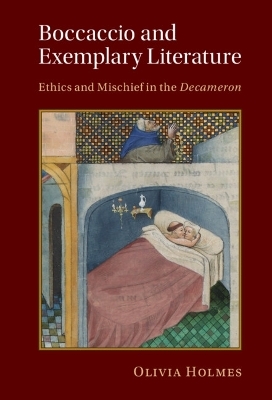
Boccaccio and Exemplary Literature
Ethics and Mischief in the Decameron
Seiten
2023
Cambridge University Press (Verlag)
978-1-009-22433-8 (ISBN)
Cambridge University Press (Verlag)
978-1-009-22433-8 (ISBN)
Olivia Homes shows how the Decameron responds to classical and medieval didactic traditions through its mischievous contents. The study will appeal to scholars of Italian literature and medieval studies, as well as to readers interested in the advent of the short story, modern narrative realism and evolutionary understandings of storytelling.
This is the first monograph to provide a comprehensive interpretation of the Decameron's response to classical and medieval didactic traditions. Olivia Holmes unearths the rich variety of Boccaccio's sources, ranging across Aesopic fables, narrative collections of Islamicate origin, sermon-stories and saints' lives, and compilations of historical anecdotes. Examining the Decameron's sceptical and sexually permissive contents in relation to medieval notions of narrative exemplarity, the study also considers how they intersect with current critical assertions of fiction's power to develop empathy and emotional intelligence. Holmes argues that Boccaccio provides readers with the opportunity to exercise both what the ancients called 'Ethics,' and our contemporaries call 'Theory of Mind.' This account of a vast tradition of tale collections and its provocative analysis of their workings will appeal to scholars of Italian literature and medieval studies, as well as to readers interested in evolutionary understandings of storytelling.
This is the first monograph to provide a comprehensive interpretation of the Decameron's response to classical and medieval didactic traditions. Olivia Holmes unearths the rich variety of Boccaccio's sources, ranging across Aesopic fables, narrative collections of Islamicate origin, sermon-stories and saints' lives, and compilations of historical anecdotes. Examining the Decameron's sceptical and sexually permissive contents in relation to medieval notions of narrative exemplarity, the study also considers how they intersect with current critical assertions of fiction's power to develop empathy and emotional intelligence. Holmes argues that Boccaccio provides readers with the opportunity to exercise both what the ancients called 'Ethics,' and our contemporaries call 'Theory of Mind.' This account of a vast tradition of tale collections and its provocative analysis of their workings will appeal to scholars of Italian literature and medieval studies, as well as to readers interested in evolutionary understandings of storytelling.
Olivia Holmes teaches Medieval Studies at Binghamton University. She has authored two previous monographs: Assembling the Lyric Self: Authorship from Troubadour Song to Italian Poetry Book (2000), which won the American Association of Italian Studies Book Award, and Dante's Two Beloveds: Ethics and Erotics in the Divine Comedy (2008).
1. Ethical fables and antifeminist exempla; 2. From sermon story to novella; 3. Lives of saints, lives of sinners; 4. Classical and vernacular exempla; 5. Magister Amoris.
| Erscheinungsdatum | 30.01.2023 |
|---|---|
| Reihe/Serie | Cambridge Studies in Medieval Literature |
| Zusatzinfo | Worked examples or Exercises |
| Verlagsort | Cambridge |
| Sprache | englisch |
| Maße | 157 x 235 mm |
| Gewicht | 550 g |
| Themenwelt | Geschichte ► Allgemeine Geschichte ► Mittelalter |
| Geisteswissenschaften ► Sprach- / Literaturwissenschaft ► Anglistik / Amerikanistik | |
| Geisteswissenschaften ► Sprach- / Literaturwissenschaft ► Literaturwissenschaft | |
| ISBN-10 | 1-009-22433-6 / 1009224336 |
| ISBN-13 | 978-1-009-22433-8 / 9781009224338 |
| Zustand | Neuware |
| Haben Sie eine Frage zum Produkt? |
Mehr entdecken
aus dem Bereich
aus dem Bereich
eine neue Geschichte des Mittelalters
Buch | Hardcover (2023)
C.H.Beck (Verlag)
CHF 53,20


